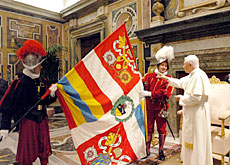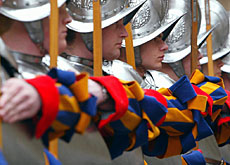The mercenaries who converted the Vatican

For 500 years, popes have been protected by Swiss guards. Originally mercenaries, their bravery and loyalty convinced Julius II to enlist them permanently.
Visitors to the Vatican cannot fail to notice the Swiss guards. Armed with antique halberds and sporting helmets adorned with ostrich plumes, their garb is much the same as in medieval times.
Legend has it that Michelangelo himself designed their eye-catching gala uniforms. But decorative though they may be, they still play an important role in defending the papacy.
The tiny “Vatican army” is the last vestige of a long tradition of Swiss military service in foreign parts. Forced by poverty to seek their fortunes abroad, many young Swiss chose to enrol as mercenaries in the service of Europe’s “great powers” – potentially a very profitable activity.
On the battlefield, they earned a reputation as loyal and invincible soldiers, to such an extent that Pope Julius II chose them for his personal bodyguard. The first 150 Swiss mercenaries entered the Eternal City on January, 22, 1506, now regarded as the founding date of the Pontifical Guard.
Sacrifice
Over the years, Swiss troops have shown great devotion in serving the head of the Catholic Church. Their bloodiest sacrifice was made on May 6, 1527, during the Sack of Rome, when 147 Swiss guards died defending Pope Clement VII from a much larger army of Lansquenets (German mercenaries) in the pay of Emperor Charles V.
Their sacrifice is remembered every year at a ceremony in the Vatican on May 6, when new recruits swear an oath of loyalty to the pontiff.
The Vatican has had other guards besides the Swiss, namely the Noble Guard, created in 1801, and the Palatine Guard, founded in 1850. But they were both disbanded in 1970 by Paul VI who decided to do away with the Vatican’s military trappings.
He made an exception for the Swiss guards because of their proven loyalty to the pontiff.
110 men
The guard today consists of 110 men, as stipulated by John Paul II in regulations which came into force in 1979.
As well as performing military service and providing a guard of honour, they control access to the Vatican City, watch over the Apostolic Palace and act as bodyguards to the pope.
Usually this involves keeping the faithful at arm’s length, but the guards must be permanently alert to danger, as was demonstrated on May 13, 1981, when John Paul II narrowly survived an assassination attempt by Turk Ali Agca.
Murder
The recent history of the Swiss guard has been tarnished by the murder of one of its commanders, Commandant Alois Estermann, and his wife. They were shot in 1998 by vice-corporal Cédric Tornay, who then killed himself.
An investigation was quickly wound up by the magistrature of the Holy See, which attributed the killings to a fit of madness by Tornay. But the incident remains shrouded in mystery and continues to fuel speculation about intrigues within the Vatican.
Career prospects
The number of applicants for the Swiss guards started to decline some five years ago, prompting the Vatican to improve training to better prepare the guards for a career outside.
Today guards receive training in information technology, acquire communications skills and are taught Italian and English. In addition, they can attend a course leading to a diploma in security studies – a useful qualification for future employment with the police or armed forces.
The effort seems to have paid off: last year the number of volunteers began to rise again. It seems the Vatican’s tiny Swiss army can look to the future with confidence.
swissinfo, Anna Passera
The Pontifical Swiss Guard consists of 110 men.
Recruits must be of Swiss nationality, male, aged 19 to 30, at least 1.74m tall, and Roman Catholic.
They must have done military service in Switzerland and hold a vocational qualification or high-school leaving certificate.
When recruited they must be single, though they may marry at a later stage.
The minimum period of service is two years.
Their monthly salary is SFr1,800, tax free. Board and lodging is included.
Under the Vatican legal system, the Swiss Guard is a military corps. But because Swiss law forbids citizens to serve in a foreign army, the papal Swiss guards have the status of a private police force.

In compliance with the JTI standards
More: SWI swissinfo.ch certified by the Journalism Trust Initiative











You can find an overview of ongoing debates with our journalists here . Please join us!
If you want to start a conversation about a topic raised in this article or want to report factual errors, email us at english@swissinfo.ch.